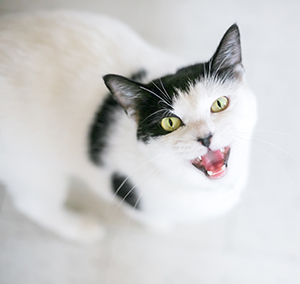
Is your cat howling, caterwauling, vocalizing, or generally making lots of noise you don’t understand? We’ve got the answers as well as some suggestions to curb this behavior.
Why Does Your Cat Howl or Vocalize?
Excessive howling (talking) can be quite worrisome as a cat caregiver. There are many reasons your cat may howl:
- Certain breeds, like the Siamese, are more likely to vocalize than other breeds.
- Some cats are deaf (often white cats with blue eyes) and they vocalize more since they can’t hear the noise.
- Perhaps your cat received attention from their “mom cat” by howling.
- Other cats develop this problem as they age.
- Cats “talk” to humans far more than they do to each other. We don’t seem to notice when they are communicating the way they do with their peers. We have made them more vocal because it is what we respond to. Being more aware of their other methods of communication can help. Cats only talk when we aren’t seeing what they are trying to convey.
- Medical problems that result in pain or other physical abnormalities, like high blood pressure, may cause a cat to vocalize more.
What Should You Do If Your Cat’s Howling Excessively?
Schedule an Appointment For a Physical Examination With Your Veterinarian
A blood panel, including a thyroid hormone level plus urinalysis will be needed for cats over eight years old, since hyperthyroid disease is often responsible for howling (especially if it happens late at night). A blood pressure test should also be run because high blood pressure and howling are linked.
If all physical causes for howling can be eliminated, the next thing to do is have your cat’s veterinarian do a thorough behavioral evaluation.
Discuss Behavioral Issues With Your Veterinarian
During a behavioral evaluation, your veterinarian will ask you when your cat is howling, and what you have already tried to do to stop the “talking.” A discussion of how your cat is interacting with other cats, dogs, and people in the family will also be explored. Could your cat be experiencing anxiety and need help relaxing?
TIP: Before your visit, use smart devices to record audio and video of your cat’s howling for your veterinarian to view or listen to.
Suggestions for Your Home
- Spray or diffuse feline facial pheromone products in your home. These products often help lower anxiety in cats.
- Schedule play sessions with your cat. Use interactive toys, like a feather wand or ball. Make sure you bring out new toys each day and remove previously used toys from the home environment. This can help your cat look forward to your play sessions and reinforce good behavior.
- Enrich your home environment with cat trees and other structures. Most cats find cat trees very appealing. This can help lower their stress level and decrease vocalization.
- Reward your cat with treats when he or she is quiet. This way your cat will learn that quiet times BRING GOOD THINGS.
- Walk away, without reacting, when your cat is howling to show that this behavior does not elicit the attention that she is seeking.
Howling and crying can be very distressing to a cat caregiver. With patience and help from your veterinarian, it is possible to decrease this behavior! Hang in there!
Contributed by Dr. Paige Garnett, DVM

